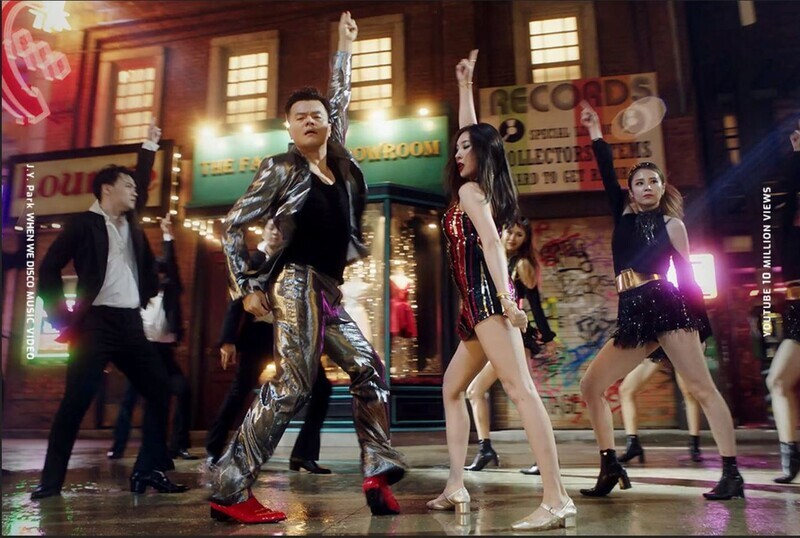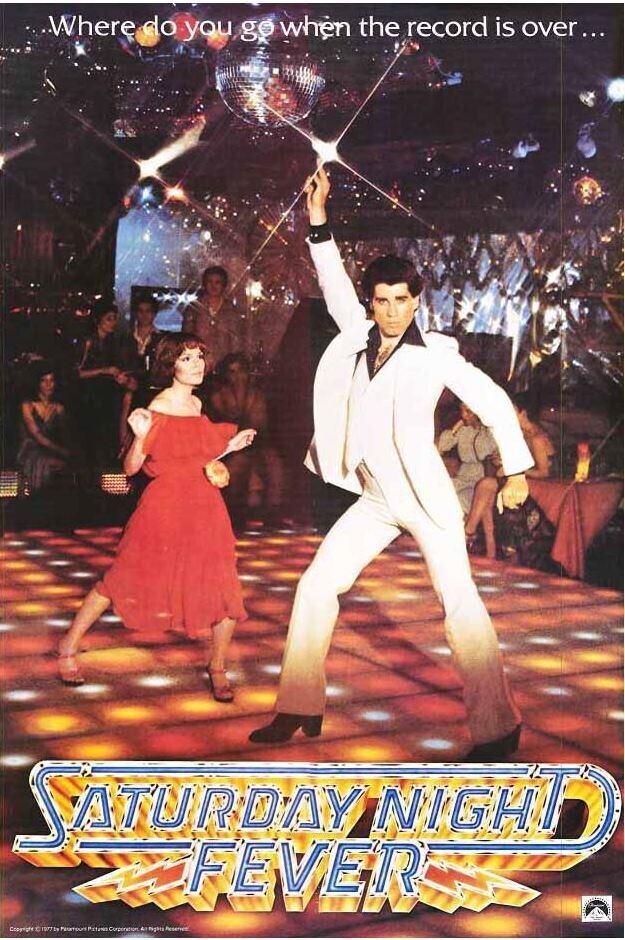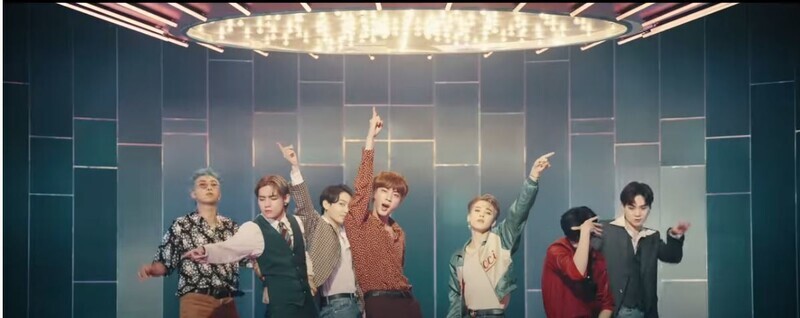hankyoreh
Links to other country sites 다른 나라 사이트 링크
A comeback of disco amid the COVID-19 pandemic

The boys move to an infectious beat, laying down lyrics full of hope. In place of their typical perfectly synchronized choreography, in which each group member moves in unison, group members groove to unique dance routines. Both the choreography and the song itself are lively and light-hearted.
On Aug. 21, BTS released their latest single “Dynamite,” an upbeat tune grounded in disco rhythms. The jabs, twirls, and kicks of disco jump out from the choreography. On top of the song and the dance moves, the retro outfits that the BTS members donned for the music video are attention-grabbing, too. The bell bottoms on their bootcut jeans, the bright patterns on their shirts, and their vintage jackets are a callback to the disco look of the 1970s and 1980s.

The response to “Dynamite” was, well, explosive. After its release on Aug. 21, the song not only dominated major South Korean streaming charts such as Genie and Flo but also claimed the top spot on the Global Top 50 tracked by Spotify, the world’s biggest streaming service. Fans are watching to see how the track performs on the Billboard Hot 100, the main singles chart, in early September. On YouTube, the music video garnered 100 million views in just 24 hours and 30 minutes, setting a new record.
Another song driving disco fever is “When We Disco,” the newest track by singer-songwriter Park Jin-young, which has stayed near the top of Genie, Flo, and other streaming charts since its release on Aug. 12. The distinctive feature of the song, as the title makes clear, is its powerful disco rhythm, which pairs Park with Sunmi (real name, Lee Sun-mi), who was Park’s protégé during her stint with the K-Pop group Wonder Girls. Quick footwork is punctuated with fingers pointing heavenward and hips swaying to the beat in a choreography that Park says he created while recalling the way he and his friends danced back in middle school. In short, we’ve entered a new era of disco.
Other songs form disco connections by blending generic boundaries. “1 Billion Views,” which was released last month by Sehun and Chanyeol, part of a subunit from the boy band EXO, is a mixture of disco and hip hop. “Don’t Come Back,” which Joo Hyun-mi released on Aug. 19 in advance of her 20th album, is a trot song with a disco rhythm.

Disco trend kicked off outside Korea with Dua Lipa and Doja Cat
This trend kicked off outside Korea. Disco made a comeback in “Future Nostalgia,” the second album by global pop star Dua Lipa, which came out back in March. And “Say So” by Doja Cat, which climbed to the top of the Billboard Hot 100 in May, gave a contemporary spin to the old genre.
Disco was the genre of dance music that swept the globe in the 1970s. Its pounding beats made it an ideal soundtrack for the dancefloor. “Saturday Night Fever,” the 1978 film starring John Travolta, was the spark that ignited the global disco phenomenon.
Critics believe that disco’s comeback is fueled by the retro fad. “The music that’s been popular around the world is mostly the synth-pop [an electronic genre featuring the synthesizer] we associate with the 1980s. More recently, the retro trend seems to be slowly moving further back in time, into the 1970s,” said Han Dong-yun, a critic of popular music.
“The disco songs coming out right now seem to be welcomed across the generational divide because they’re familiar to the older generation while sounding fresh to novelty seekers in the younger generation,” said Park Eun-seok, another pop music critic. That echoed what BTS member J-Hope (real name Jung Ho-seok) said during a live broadcast on Naver’s V Live service to mark the single’s release on Aug. 21. “This was amazing to us since we’re not from the disco generation,” he said.

Some analysts also point to the social and economic impact of the COVID-19 pandemic. “When disco was trending in the 1970s, the US was facing a recession caused by the Vietnam War and two oil crises. That kind of resembles the social and economic difficulties we’re dealing with right now because of COVID-19. When people are having a tough time, what they turn to isn’t complicated music but simple party music that can help them forget their troubles. The best example of that kind of music is disco,” said Han Dong-yun.
How long will disco remain in the limelight? “Changes in the media environment have caused trends to evolve faster than before. That could mean the disco revival is just a passing fad,” Park Eun-seok said.
“If fans keep responding and songs keep coming out, disco could go down as the musical genre that defines the coronavirus era,” she added.
By Kim Kyung-wook, reporter
Please direct comments or questions to [english@hani.co.kr]

Editorial・opinion
![[Editorial] Does Yoon think the Korean public is wrong? [Editorial] Does Yoon think the Korean public is wrong?](https://flexible.img.hani.co.kr/flexible/normal/500/300/imgdb/original/2024/0417/8517133419684774.jpg) [Editorial] Does Yoon think the Korean public is wrong?
[Editorial] Does Yoon think the Korean public is wrong?![[Editorial] As it bolsters its alliance with US, Japan must be accountable for past [Editorial] As it bolsters its alliance with US, Japan must be accountable for past](https://flexible.img.hani.co.kr/flexible/normal/500/300/imgdb/original/2024/0417/6817133413968321.jpg) [Editorial] As it bolsters its alliance with US, Japan must be accountable for past
[Editorial] As it bolsters its alliance with US, Japan must be accountable for past- [Guest essay] Amending the Constitution is Yoon’s key to leaving office in public’s good graces
- [Editorial] 10 years on, lessons of Sewol tragedy must never be forgotten
- [Column] A death blow to Korea’s prosecutor politics
- [Correspondent’s column] The US and the end of Japanese pacifism
- [Guest essay] How Korea turned its trainee doctors into monsters
- [Guest essay] As someone who helped forge Seoul-Moscow ties, their status today troubles me
- [Editorial] Koreans sent a loud and clear message to Yoon
- [Column] In Korea’s midterm elections, it’s time for accountability
Most viewed articles
- 1[Column] The clock is ticking for Korea’s first lady
- 2Samsung barricades office as unionized workers strike for better conditions
- 3[Editorial] When the choice is kids or career, Korea will never overcome birth rate woes
- 4[News analysis] After elections, prosecutorial reform will likely make legislative agenda
- 5S. Korea, Japan reaffirm commitment to strengthening trilateral ties with US
- 6Why Israel isn’t hitting Iran with immediate retaliation
- 7[Guest essay] How Korea turned its trainee doctors into monsters
- 8Japan officially says compensation of Korean forced laborers isn’t its responsibility
- 9[Editorial] Does Yoon think the Korean public is wrong?
- 10[Editorial] 10 years on, lessons of Sewol tragedy must never be forgotten